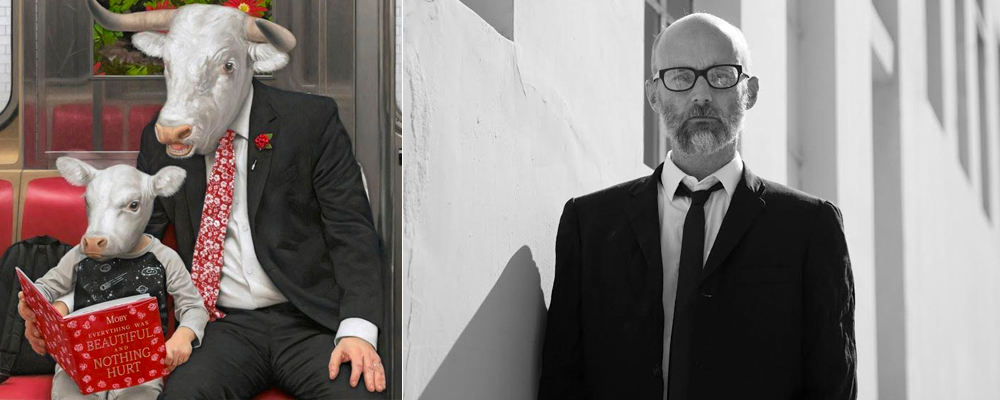Moby Captures Paradise Lost With ‘Everything Was Beautiful, and Nothing Hurt’
Adi Mehta
Moby is widely credited for bringing dance music to the mainstream in the ‘90s. He has gone on to dabble in alternative rock and ambient work, and has made a name for himself as an activist, most notably for bringing well-due attention to the topics of veganism and animal rights. For someone who had such a good run, and achieved icon-like status in a certain era, it’s only natural to look to the past with rose-tinted glasses. And so, Moby has brought us his appropriately titled new record, “Everything Was Beautiful, and Nothing Hurt.”
One might feel inclined to dismiss such a nostalgia-driven album as some midlife crisis drivel, a reminiscing of younger years, life’s regrets and time lost. In this particular case, however, Moby’s nostalgia is very understandable. Consider the album’s title in this light: other than a short lived Gulf War, there was a considerably lengthy period for the X Gen between the Vietnam War and 9/11 — and the subsequent “War on Terrorism” — when America was basically “at peace.” The world seemed okay and the digital revolution had yet to completely shatter American ideals. Now, flash forward to 2018: the NSA is spying on you, ISIS is beheading people, Tinder matches are catfishing you, and then, well, there is Global Warming.
Clearly, Moby has a point with his nostalgia. The album’s cover art conveys the idea effectively. It pictures two people with the faces of cows — or two cows with the bodies of people. Presumably, it’s a father and son, and the son is reading a book that bears the title of the album. It seems to suggest that we’ve all become mere cattle, bleating in chorus with the herd. And while the father himself is one of the cattle, he knows of an earlier time when “everything was (relatively) beautiful.” Like the book that the depicted child is reading, this record serves as a permanent reminder of a temporary feeling, a means of reliving, or at least imaging, something long gone.
The album has a decidedly political feel as Moby paints a rather bleak picture, with songs titled, “Mere Anarchy” and “Welcome to the Hard Times.” “Mere Anarchy” is lifted from a Yeats poem, “The Second Coming,” which describes the wake of the first world war with apocalyptic imagery. As the album’s opening track, it immediately establishes a dystopian thread, which lasts all the way through the final song, “A Dark Cloud is Coming,” in which the lyrics, “A dark cloud is coming / Come to me,” seem to accept impending doom as inevitable.
On “Like A Motherless Child” the lyrics “Sometimes I feel like a motherless child” recasts the age-old lyric in the context of today’s society. With so much of our lives lived on the internet and on our iPhones, life grows steadily more impersonal, mechanical, isolated, and fragmented. Like the child in the cover art, any millennial might quite rightly feel like a motherless child.
Sonically, Moby has a very distinctive accent on the album. He has spoken word segments in which he sounds part British (randomly), part American, but equal parts somber. “There’s no sight, I can’t accept what I see,” he declares on “The Last of Goodbyes,” “There’s no grace, I can’t accept what I’ll be.” This is very much the overarching theme of the album.
There are a lot of big beats and sweeping strings, beginning with the opening track “Mere Anarchy,” and featured prominently throughout the record, making the songs grand and epic. Breakbeats carry most of the tracks, in the “trip hop” tradition with which Moby has come to be associated, although that genre description seems a bit of a misnomer, as Moby’s songs are not at all “trippy.” They’re more like vaguely dance-related, easy-listening tunes. There’s a consistent downtempo feel to the album. Yet, there is also an anthemic quality to many of the songs,
Several songs, such as “The Ceremony of Innocence” have Moby’s vocals in rather low fidelity, almost as if recorded on a phone. This imparts a certain intimacy, and achieves considerable emotional affect. The orchestration, however, can strike as farcical, and the whole package can be a bit hard to make sense of. There’s always a generic ‘90s hip hop beat, and new-agey synth strings. It’s all tears and tofu.
Still, you’ve got to give it to Moby. He’s a voice of compassion and empathy in a cold, chaotic world. And with “Everything Was Beautiful,” he makes an effective and important artistic statement. The major issue with this album, arguably, is how dated it sounds. But is that really a problem? The definitive answer is no, not at all. It’s quite obvious that Moby knows what he’s doing. And for that, he’s done very well.
“Everything Was Beautiful, and Nothing Hurt” is available March 2 on Apple Music.

